Philippines: Inflation eases to 7.6% in March
MANILA, Philippines — Inflation the rate of increase in the prices of consumer goods and services further eased in March due to slower upticks in food and transport costs, the Philippine Statistics Authority (PSA) reported yesterday.
In a briefing, PSA chief Dennis Mapa said headline inflation slowed down to 7.6 percent in March from 8.6 percent in February.
This is the slowest inflation seen in six months or since the 6.9 percent print in September last year.
The latest inflation figure, however, is still faster than the four percent rate in the same month last year.
The March inflation also falls within the 7.4 to 8.2 percent forecast of the Bangko Sentral ng Pilipinas for the month.
For the first quarter, inflation averaged 8.3 percent.
Mapa said the downtrend in overall inflation in March was mainly due to the slower increase in prices of food and non-alcoholic beverages, which had a lower inflation rate of 9.3 percent last month from 10.8 percent in February.
Food inflation continued to decelerate to 9.5 percent in March from 11.1 percent in February due to the easing price hikes in vegetables, meat, and sugar, confectionery and desserts.
Mapa said the transport commodity group also contributed to the downtrend in overall inflation with 5.3 percent in March, lower than the nine percent in February.
Another primary driver of the lower inflation was housing, water, electricity, gas and other fuels commodity group, which recorded a 7.6 percent rate in March from 8.6 percent in February.
Other commodity groups with lower inflation in March compared to February were health, and information and communication.
Meanwhile, core inflation, which strips off volatile food and energy items in the consumer price index (CPI), climbed further to eight percent in March from 7.8 percent in February.
While overall inflation is going down, Mapa said the challenge is to bring it down further.
“Core inflation is higher…Some of the items in the basket seem to still be increasing,” he said.
In an email note, Oxford Economics assistant economist Makoto Tsuchiya said prices are expected to trend down through the year as supply-side bottlenecks continue to ease.
He also said core inflation should slow down as the effect of monetary tightening kicks in.
“That said, there are still some upside risks. Particularly, recent announcement of oil production cut by the OPEC (Organization of the Petroleum Exporting Countries) will push up oil prices. Also, food prices are vulnerable to further weather-related disturbances, particularly during the typhoon season in the summer,” he said
Even as inflation is beginning to slow down, NEDA Secretary Arsenio Balisacan said the government would continue to focus on addressing issues affecting prices.
“Protecting the purchasing power of Filipinos, especially the most vulnerable sectors of the economy, is one of the top priorities of the administration, which we have also laid out in the Philippine Development Plan 2023 to 2028. We are committed to provide policy advice and anticipatory recommendations that are supported by data to manage inflation and protect the Filipino families,” he said.
He also said the Inter-Agency Committee on Inflation and Market Outlook formed to come up with strategies to address high inflation, would offer proactive policy recommendations to threats to food supply such as the potential escalation of African swine fever and the weather disturbances linked with the El Niño phenomenon.
“We need a robust monitoring system and forecasting tools supported by reliable and timely information that will assist us in offering appropriate recommendations to the President and the Cabinet. These will help us in developing suitable policies and interventions to achieve food and energy security, while ensuring that our country stays on course to sustained economic transformation and inclusive growth,” he said.
Source: https://www.philstar.com/business/2023/04/06/2257159/inflation-eases-76-march


 English
English




